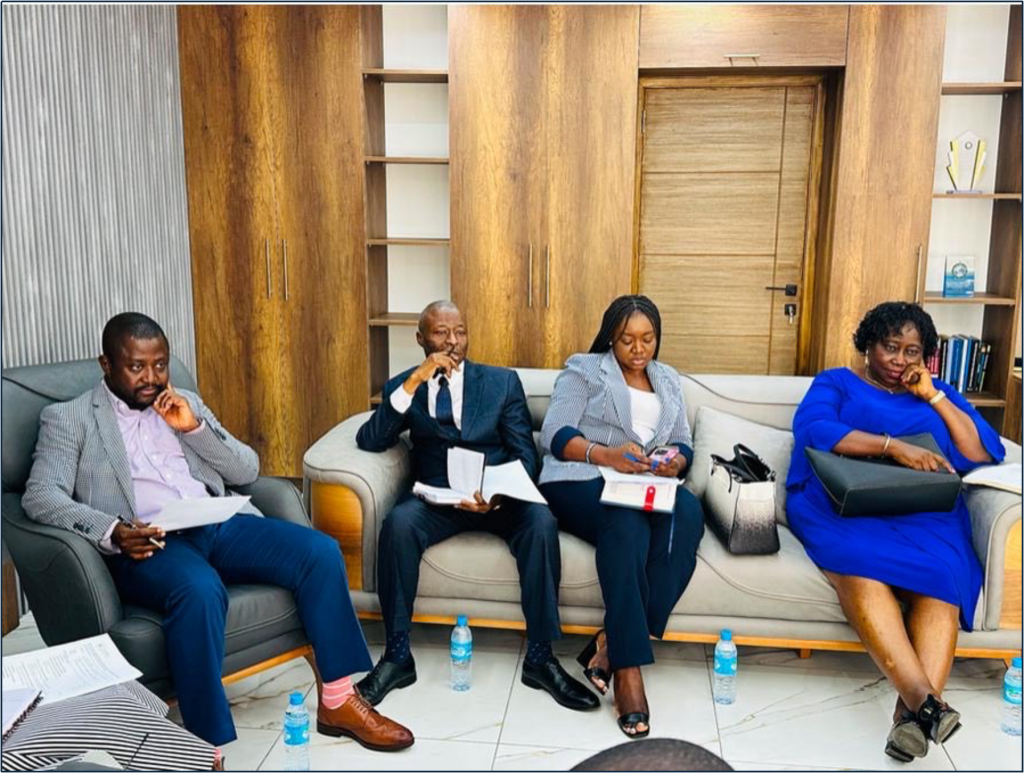By Sonny Gilbert
In a move towards enhancing the efficiency and effectiveness of the country’s justice system, the Hon. Attorney General and Minister of Justice, Alpha Sesay Esq, convened a pivotal inaugural meeting with the Heads of Justice Sector Institutions today.
The primary focus of the meeting was to deliberate on vital strategies to improve coordination and cooperation among various institutions involved in the implementation of the Justice Sector Reform Strategy for the period 2024 to 2030.
The meeting was attended by key figures in the justice sector, including the Deputy Minister of Justice, the Solicitor General, and the Director of Public Prosecutions. Notable institutional heads present included the Hon. Justice Alusine Sesay (JSC), representing the Hon. Chief Justice of the Sierra Judiciary, the Executive Director of the Legal Aid Board, the Ombudsman, the Administrator and Registrar General along with her Deputy, the Coordinator of the Justice Sector Coordination Office, and a Commissioner from the Human Rights Commission.
In his opening address, Attorney General Sesay underscored the necessity of a unified strategy for implementing the Justice Sector Reforms. He pointed out that the Justice Sector Reform Strategy (2024-2030) is not only aligned with the country’s Medium-Term National Development Plan but also resonates with the United Nations Sustainable Development Goals under Agenda 2030. The strategy lays out an extensive roadmap for reforming the justice sector, with a focus on ensuring equitable access to justice for all, improving case management, adhering to human rights principles, and enhancing the operational capacity of justice institutions. The Attorney General called upon the heads of institutions to prioritize the key policy areas and activities outlined in the Strategy.
He emphasized the importance of legal and judicial reforms, capacity building initiatives, and the integration of technology to streamline justice delivery processes. Moreover, he highlighted the need for making justice services and facilities accessible to all citizens, ensuring that no one is left behind. During the meeting, each participant had the opportunity to present their institutional priorities for the years 2025 and 2026. The discussions revealed a shared understanding of the necessity for a more coordinated and collaborative approach to delivering justice services. It was agreed that a review of the existing Justice Sector Communications Strategy (2021-2025) was imperative to assess its effectiveness in facilitating information sharing and collaboration among justice sector institutions. Participants recognized the need to modernize the Communications Strategy to address emerging challenges and opportunities, particularly in the realm of digital communication and public engagement.
The Attorney General emphasized the importance of fostering public trust in the justice system and effectively communicating the sector’s achievements while addressing public concerns. In a bold challenge, he urged the Justice Sector Communications Team to develop a new Communications Framework aimed at boosting transparency, accountability, and stakeholder engagement. This framework would promote a culture of open dialogue, ensuring timely dissemination of information and enhancing public awareness of justice sector initiatives. The meeting further highlighted the necessity to strengthen reporting and coordination mechanisms among justice sector institutions.
In the spirit of collaboration, the heads of institutions committed to ensuring the timely submission of quarterly and annual reports. These reports will serve as tools for monitoring progress, identifying challenges, and informing strategic decision-making. The Attorney General stressed the importance of data-driven approaches to enhance accountability and measure the impacts of various justice sector interventions. He believes that a robust framework for data collection and analysis will be crucial in refining strategies and ensuring that the justice system is responsive to the needs of the citizens. In concluding the meeting, Attorney General Sesay expressed optimism about the outcomes of the discussions, viewing them as a significant step towards fostering greater collaboration and synergy among justice sector institutions. He reaffirmed the government’s commitment to building a justice system that is efficient, accessible, and responsive to the diverse needs of all citizens. The Attorney General extended his gratitude to all stakeholders for their active participation in the meeting and reiterated the government’s dedication to implementing the Justice Sector Reform Strategy. He emphasized that ensuring equitable access to a fair and efficient justice system is a fundamental right for all citizens. The meeting concluded with a collective commitment from all stakeholders to work collaboratively towards achieving the goals outlined in the Justice Sector Reform Strategy, marking a new chapter in the pursuit of justice and accountability in the country.
